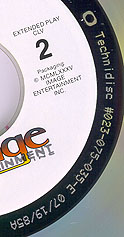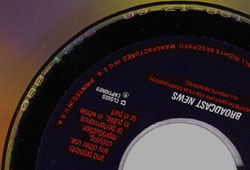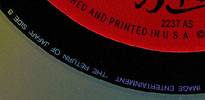 Trying to branch out into the consumer disc market, they convinced Warner Home Video to let them press "Greystoke: The Legend of Tarzan". Discs from this period were encoded with Minute Only timing, and the time elapsed on Side 1 was retained on Side 2, meaning you could actually tell the total elapsed time for a 2-sided film. Searching on the "B" sides was a bit of a trick though.
Trying to branch out into the consumer disc market, they convinced Warner Home Video to let them press "Greystoke: The Legend of Tarzan". Discs from this period were encoded with Minute Only timing, and the time elapsed on Side 1 was retained on Side 2, meaning you could actually tell the total elapsed time for a 2-sided film. Searching on the "B" sides was a bit of a trick though.Discs for "Greystoke" were mastered in September & October 1984, and while Pioneer was right at the height of it's LaserRot problem, Technidisc looked like they might be a viable alternative. This period of Technidisc I have coined Technidisc I. Greystoke suffered from minor speckling which varied from copy to copy, but the big problem was warping and the inability of the players (at the time) to deal the variances in the warp. Alas, cone warping would become the least of their troubles.
At the same time, fledgling independent producer "Image Entertainment" was also trying to grow beyond its "pornography" beginnings (their first 30 or so titles were all "adult material") and they secured LaserDisc rights to the "New World Home Video" and "Media Home Video". The impressive catalog of titles included such classics as "Fraternity Vacation", "Tuff Turf", "Lust in the Dust" and "Girls Just Want to Have Fun", while Media Home Video's only real claim up to that point was "A Nightmare on Elm Street."
By the end of 1985, Technidisc discs were failing at an astronomical rate of near 100%. Troubles included horrific LaserRot where entire discs would become unplayable, to actual disc separation. The plant closed its doors and all titles they produced went out of print. Image Entertainment in the unusual position of deciding which titles would be continued in the catalog by not repressing them at Pioneer - at the time, the only major facility in the US. How and why some titles were transitioned to Pioneer is unknown. "Girls Just Want to Have Fun" was put out of print, but "Sexy Shorts", "Bolero" and "Night Patrol" continued to be available through Pioneer.
Technidisc had essentially withdrawn from consumer disc replication. Their industrial output in 1985 also suffered, but by mid-1986 most of the rot trouble behind them, the industrial titles were going out clean - and with the reduced volume - staying clean. A few rotted discs still popped up, but they were generally much better. Late in 1986 and into 1987, Technidisc started to retool the facility, added CD replication capabilities (mostly in the CD-Rom market). Output was still limited to industrial customers. In 1988, Image Entertainment took another gamble with Technidisc after having seen newly mastered and replicated copies of "Greystoke". Technidisc had switched over to the more conventional CAA encoding for extended play discs. Having signed exclusive distributorships with Buena Vista
 Distribution (responsible for the entire Walt Disney and Touchstone catalog), CBS/Fox Video and TriStar Pictures, they were under increased pressure to produce all these titles. Drawing from the Pioneer well for 100% of their replication needs was not going to be possible, not
Distribution (responsible for the entire Walt Disney and Touchstone catalog), CBS/Fox Video and TriStar Pictures, they were under increased pressure to produce all these titles. Drawing from the Pioneer well for 100% of their replication needs was not going to be possible, not  only for for pressing time restrictions, but cost restrictions as well. Between Technidisc and 3M Manufacturing Image was able to reduce costs and avoid Pioneer completely. "Greystoke" returned to production through Warner Home Video with the updated discs. In fact, at no point was the original Pan & Scan edition of Greystoke available from any replication house other than Technidisc.
only for for pressing time restrictions, but cost restrictions as well. Between Technidisc and 3M Manufacturing Image was able to reduce costs and avoid Pioneer completely. "Greystoke" returned to production through Warner Home Video with the updated discs. In fact, at no point was the original Pan & Scan edition of Greystoke available from any replication house other than Technidisc.Discs pressed in this period, which I call Technidisc II, are represented by the two images to the left and right above. While they look somewhat different, the only real difference is the size of the inner band the numbers are written on. It is also possible for there to be no band at all (as on "Toto: Past to Present"), but the numbers used are always present on this series of discs. I have not fully determined the complete meanings of the numbers, except they obviously carry the date of mastering, something that Technidisc continued through the end of their production life. The samples used for these scans are Touchstone's "Good Morning, Vietnam" and CBS/Fox's "Broadcast News". Other titles pressed by Technidisc during this period included the Deluxe edition of "The Dark Crystal", "Suspect" and "Better Off Dead".
Technidisc had cleaned up their process. Discs stayed glued together, LaserRot had all but vanished and the warping problem was gone. However, the discs lacked a "professional look" to them. Labels were applied poorly, sometimes being so off center, they would cover the hole of the disc. Labels were often poorly reproduced with the inks running if wiped with a damp cloth and fading. Some speckling was present, but no where near the degree we had seen before. On occasion, some higher volume titles would require you to go through several copies to find acceptable copies. I personally went through over 10 copies of "The Dark Crystal" before finding good copies of all sides.
A steady stream of titles - nearly all from Image Entertainment - flowed through the end of 1991. To increase demand, the factory was retooled again in 1992, the facility coming on line in the first half of the year. This new variant I call Technidisc III, and they really stepped up their game. Some titles suffered
 from high-frequency speckling, which varied from disc to disc and from title to title. Acceptable copies of all discs could be found. Mint markings samples for Technidisc III, taken from Buena Vista's "Return of Jafar", are shown here.
from high-frequency speckling, which varied from disc to disc and from title to title. Acceptable copies of all discs could be found. Mint markings samples for Technidisc III, taken from Buena Vista's "Return of Jafar", are shown here.
Technidisc now offered an option to not have the name Technidisc appear anywhere on the disc. This was evident on FoxVideo's release of Alien3, which included all the markings on these samples, but omitted the "TV" logo and "Technidisc" which are present in the image on the left. The mint markings aside, Technidisc continued to suffer from random replication issues. Single line dropouts were common and metallization errors pop up from time to time. Criterion would have Technidisc press 5 titles in their catalog, the most prominent of which was The Prince of Tides. Replication was so problematic for this title, Criterion would not let Image (the distributor of their titles at this time) master any other titles at the facility.
Leading up to their eventual closure, Technidisc produced a huge number of titles for Image and small labels, but very little "first run" A-Ttiles. Several Fox titles got repressed like "Young Frankenstein," "Silver Streak," "The Sound of Music" and all three "Star Wars" titles, but these were not "New Releases" only catalog refill. Without large volume orders to sustain operation, Technidisc closed its doors for the last time on August 12, 1996.